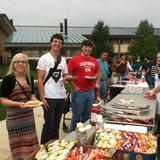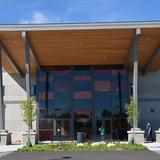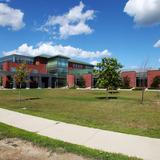- Northwestern Michigan College is a community college established in 1951 in Traverse City, Michigan. Our enrollment for credited classes is approximately 5,000 students per semester. NMC offers associates degrees and professional certificates at our main campuses, and through our University Center, we grant baccalaureate and graduate degrees from 10 partner universities.
School Highlights
Northwestern Michigan College serves 3,629 students (33% of students are full-time).
The college's student-teacher ratio of 8:1 is lower than the state community college average of 19:1.
Minority enrollment is 22% of the student body (majority Hispanic), which is less than the state average of 40%.
Quick Facts (2026)
- Enrollment: 3,629 students
- In-state tuition: $5,645
- Out-state tuition: $6,994
- Student-teacher ratio: 8:1
- Minority enrollment: 22%
- Source: Integrated Postsecondary Education Data System (IPEDS)
School Overview
The teacher population of 437 teachers has stayed relatively flat over five years.
Northwestern Michigan College
(MI) Community College Avg.
Carnegie Classification
Baccalaureate/Associate's Colleges: Associate's Dominant
Baccalaureate/Associate's Colleges: Associate's Dominant
Institution Level
Four or more years
At least 2 but less than 4 years
Institution Control
Public
Public
Total Faculty
437 staff
224 staff
School Calendar
Student Body
The student population of Northwestern Michigan College has grown by 10% over five years.
The student-teacher ratio of 8:1 has decreased from 26:1 over five years.
The Northwestern Michigan College diversity score of 0.38 is less than the state average of 0.60. The school's diversity has grown by 57% over five years.
Total Enrollment
3,629 students
3,006 students
Student-Teacher Ratio
8:1
19:1
# Full-Time Students
1,181 students
904 students
# Part-Time Students
2,448 students
2,102 students
# Enrollment Undergraduate
362 students
219 students
# Full-Time Undergraduate Students
1,181 students
965 students
# Full-Time Graduate Students
n/a
4 students
# Part-Time Undergraduate Students
2,448 students
2,448 students
# Part-Time Graduate Students
n/a
4 students
Total Dormitory Capacity
511 students
188 students
% American Indian/Alaskan
1%
n/a
% Asian
1%
4%
% Hispanic
5%
7%
% Black
1%
16%
% White
78%
60%
% Hawaiian
n/a
1%
% Two or more races
4%
4%
% Non Resident races
n/a
2%
% Unknown races
9%
6%
Diversity Score
0.38
0.60
College Completion Rate (Students who graduate in less than 4 years)
17%
14%
College Completion Rate (Students who graduate in 4 years or more than 4 years)
24%
20%
Average Graduate Earnings (10 Years)
$33,000
$30,700
Tuition and Acceptance Rate
The public in-state tuition of $5,645 is more than the state average of $5,506. The in-state tuition has declined by 31% over four years.
The public out-state tuition of $6,994 is less than the state average of $7,381. The out-state tuition has declined by 33% over four years.
In-State Tuition Fees
$5,645
$5,506
Out-State Tuition Fees
$6,994
$7,381
% Students Receiving Some Financial Aid
77%
88%
Median Debt for Graduates
$12,836
$11,704
Median Debt for Dropouts
$5,500
$5,500
Acceptance Rate
n/a
100%
Source: 2024 (or latest year available) Integrated Postsecondary Education Data System (IPEDS) , School Administrators
School Notes
- NMC is the country's only college to have a Maritime academy on fresh water. The Great Lakes Maritime Academy is located at the spectacular Great Lakes Campus located on the shores of Grand Traverse Bay, a long protected water of Lake Michigan. Maritime is one of six state maritime academies that receives aid from the federal Maritime Administration. The Great Lakes Campus also houses the Great Lakes Culinary Institute, the only culinary school in Northern Michigan. NMC is home to the Dennos Museum Center, the Rogers Observatory, the Water Studies Institute, and the Michigan Technical Education Center, which operates one of the few community college Aviation programs in the country. NMC's extensive extended education program offers a vast array of non-credit classes to over 10,000 local residents annually. NMC offers one Associate in Science & Arts (ASA) degree: General Liberal Arts & Sciences, that is designed as a degree to prepare students for transfer to four-year schools. This can combine courses from several academic areas. NMC offers several Associate in Applied Science (AAS) degrees and certificates through these Academic Areas: Aviation, Business, Bridge Program, Communications, Computer Information Systems (IT), Great Lakes Culinary Institute, Great Lakes Maritime Academy, Health Occupations, Humanities, M-TEC: Michigan Technical Education Center Physical Education, Science/Math and Social Science. The Dennos Museum Center at Northwestern Michigan College is the region's premier cultural facility offering both major exhibitions in the arts and sciences and live performances in jazz, blues, folk and world music by national and international artists. The museum averages 60,000 visits a year, holds one of the largest and most historically complete collections of Inuit art in the United States, and won the Governor's Arts Award for Arts and Culture in 2000.
Frequently Asked Questions
How much does Northwestern Michigan College cost?
Northwestern Michigan College's tuition is approximately $5,645 for In-State students and $6,994 for Out-State students.
Recent Articles

How to Transfer to a Four-Year University Without Losing Credits
Learn how to transfer to a four-year university without losing credits in 2026, including agreements, planning tips, and expert guidance.

First-Generation Student Guide to Community College Success
A first-generation student guide to navigating your first semester at community college, with academic, financial, and campus life strategies.

Most In-Demand Community College Majors for 2025–26
Explore the most in-demand community college majors for 2025–26 workforce needs, aligned with hiring trends, wages, and transfer pathways.












